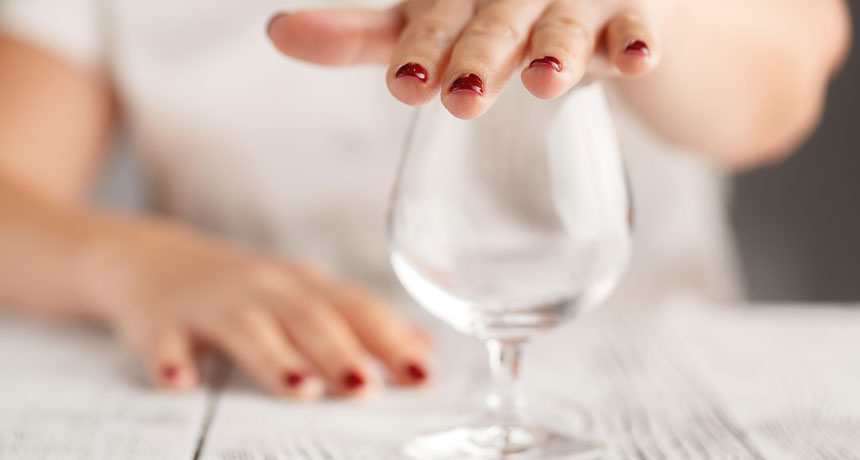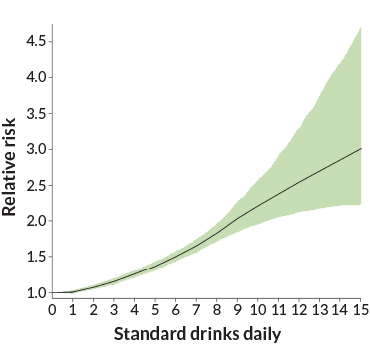Drinking studies muddied the waters around the safety of alcohol use
Meta-analyses advocate consuming little to no alcohol

RISKY BUSINESS While drinking in excess is undoubtedly unhealthy, studies and headlines this year focused on the risks of a single drink per day.
Andrey Cherkasov/Alamy Stock Photo
For people who enjoy an occasional cocktail, 2018 was a sobering year. Headlines delivered the news with stone-cold certainty: Alcohol — in any amount — is bad for your health. “The safest level of drinking is none,” a group of scientists concluded.
That finding, along with another one reported this year, seemed to contradict the reassuring notion that an occasional drink might be good for you (SN: 9/5/15, p. 10). But the two studies were met with a flurry of criticism. While drinking in excess is undoubtedly unhealthy, a finding confirmed by this year’s research, the studies and the headlines focused on the risks of a single drink per day. And that’s a risk the analyses weren’t designed to address.
“These studies clearly show that alcohol is a huge health problem,” says Stanford University epidemiologist John Ioannidis, who was not involved in the studies. “But the emphasis was placed on no amount of alcohol being safe, and that’s wrong.”
Both studies were meta-analyses. They combined data from numerous observational studies that tracked what large numbers of people drank over time and compared rates of disease or death in those populations. For the first study, a team from the University of Cambridge combined 83 studies that looked for links between drinking and the risk of death or cardiovascular disease in nearly 600,000 people in 19 countries.
People who had more than about seven drinks per week (one drink is 12 ounces of beer, five ounces of wine or 1.5 ounces of distilled spirits) had a lower life expectancy and a higher risk of stroke, heart failure, fatal aneurysm and other problems than lighter drinkers. The more booze imbibed, the greater the risk of earlier death, the team reported in the April 14 Lancet.
The second study — with the dramatic conclusion that anything more than abstinence is risky — looked at nearly 700 studies including millions of people. The team, led by researchers at the University of Washington in Seattle, tried to get a snapshot of the world’s health if no one drank alcohol. The team considered 23 health problems caused or exacerbated by drinking, including tuberculosis, car accidents, diabetes and various cancers.
In a world of teetotalers, there would have been 2.8 million fewer deaths in 2016 alone, the team reported in the Sept. 22 Lancet.
Few took issue with this broad-brush conclusion. But the results didn’t support the notion that no amount of alcohol is safe. In fact, a figure in the study showed that an increased risk of death begins somewhere slightly above one drink per day.
Study coauthor Emmanuela Gakidou, an expert in health metrics, acknowledges that the risks for light to moderate drinkers are small. In a given year, 914 per 100,000 people who drink no alcohol will die from one of the health conditions examined in the study. If all those people had one drink per day in that year, an extra four, for a total of 918, would die.
“Saying to yourself, having a glass of wine presents a small risk, but I enjoy it — OK, that’s fine,” Gakidou says. “But I would like people to move away from thinking drinking is good for you.”
The controversy over these studies highlights the challenges of studying the interaction of diet and human health, Ioannidis says. “Observational studies are in a very tough position to give us an answer to questions like, is one drink bad or beneficial.” There are too many confounding factors, such as the different lifestyles, health and backgrounds of the people in the studies. “When trying to study small risks, it is very difficult to get all of these factors out of the way,” he says.
Because observational studies merely observe, they can’t establish cause and effect. And meta-analyses in particular, in which many studies are combined and statistically analyzed, can appear to lend weight to a broad conclusion, even when it’s not justified (SN Online: 4/23/18).
In the case of alcohol, focusing on the dangers of one drink per day isn’t just flawed, it “runs the risk of diminishing attention to problem drinking,” says Elliot Tapper, a physician at the University of Michigan Medical School in Ann Arbor.
Alcohol in excess can be toxic to the liver, and excessive drinking appears to be a growing problem, especially among young adults. From 2009 to 2016, U.S. deaths from alcohol-related cirrhosis, a scarring of the liver, went up on average 10.5 percent each year among those ages 25 to 34. White, Native American and Hispanic men experienced the most fatalities, Tapper and a colleague reported in July in BMJ.
As for drinking in moderation, the only way to find out if it is beneficial or harmful is with a randomized controlled trial in which two comparable groups of people are given different interventions, such as drink vs. no drink. Such a study was under way, but the National Institutes of Health canceled it in June after learning that the researchers secretly conferred with and solicited funding from beer and liquor executives when planning the study.
Until a randomized controlled trial is done, Tapper says, “use a dose of common sense when considering how much to drink.”









